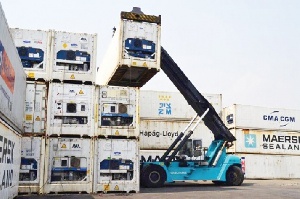Stakeholders in the proposed paperless transactions at the nation’s entry points have firmed up their commitment to the September 1, 2017 date for take-off.
Existing electronic platforms which support paperless transactions at the port are expected to facilitate the successful implementation of the programme, but it has become necessary to clearly define roles, improve information sharing among stakeholders and enhance integrity among people who work at the ports and entry points.
“There is the need for people importing into our country to be transparent,” Mr Daniel Nii Kwartei Titus-Glover, Chairman of the Trade, Industry and Tourism Committee of Parliament, said. “They must hold their integrity because we need money to run this country, so if people under declare, making it difficult for the Customs Division of the Ghana Revenue Authority to come out with the right value, it makes it a difficult thing for all of us,” he said.
Mr Titus-Glover said this when he briefed journalists after the committee had met at the Parliament House with industry players at Ghana’s ports and harbours over how they are prepared to meet the September 1, 2017 deadline directed by Vice President Dr Mahamudu Bawumia and appealed to them to be guided by truthfulness.
As part of government’s commitment to formalising the economy and to bring to the minimum the inefficiencies and man-made bottlenecks that have direct bearings on revenue collection, Vice President Bawumia has urged all service agencies at the country’s ports to switch to a paperless system by September 2017.
Furthermore, the move is to halt collusion among importers, clearing agents and customs officials that exploit the existing system at the port to the disadvantage of the nation.
In was in furtherance of this commitment that agencies including the Ghana Ports and Harbours Authority, Ghana Standards Authority, Food and Drugs Authority, Ghana Atomic Energy Commission, the Customs Division of the Ghana Revenue Authority, the Ghana Institute of Freight Forwarders (GIFF) West Blue and the Ghana Community Network System Services Limited (GCNet) met the Trade, Industry and Tourism Committee in Parliament on Tuesday, to update it on steps being taken to meet the deadline.
Others at the meeting were the Environmental Protection Agency, The Ghana Airport Company, the Veterinary Services Division and the Aviance Cargo Company.
The paperless transactions at the ports would be piloted by the Customs Division of the Ghana Revenue Authority before it is finally rolled out in September. Mr Titus-Glover, who is also the Deputy Minister of Transport and MP for Tema East, said the pilot should prompt amendments towards the implementation of the new regime.
“The Customs Division of the Ghana Revenue Authority has indicated that there will be a pilot programme which will involve all stakeholders. Based on that then we will see the way forward if there are certain challenges we will be able to identify them,” he said.
In 2013, Ghana hatched the idea of going paperless, but implementation was not completely carried through because industry players felt uncomfortable with the new system, which was fraught with duplication of roles in some cases. Mr Titus-Glover urged GCNet and West Blue to effectively collaborate and clearly define roles to avoid the seeming conflicts between the two agencies spearheading the move.
The GCNet is an Electronic Data Interchange (EDI) system that links all the major players in the clearing process. The EDI allows for electronic interchange of business information using a standardised format; a process which allows one company to send information to another company electronically rather than with paper. Business entities conducting business electronically are called trading partners.
West Blue Consulting, a business and IT-consulting and technology firm, who are providing technical support for the Customs Division of the Ghana Revenue Authority, has enhanced the Pre-Arrival and Assessment Report System of the Ghana National Single Window.
In line with the ports, entry points, and trade routes reforms, the Customs Division of the Ghana Revenue Authority (GRA) has started removing customs barriers along the country’s transit trade routes. Only four of the barriers are being maintained and about 60 cleared.
The four are Dabala in the Volta Region; Salvelugu in the Northern Region; Offinso in the Ashanti Region and Elubo in the Western Region. Mr Isaac Crentsil, the Acting Commissioner of Customs, told the meeting that the retention of the barriers would be to check armed robbery, smuggling and the illegal movement of arms.
Business News of Saturday, 15 July 2017
Source: 3newsonline.com













